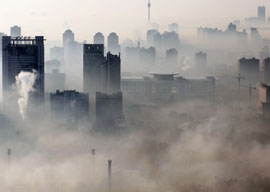
January 24, 2014

Linfen, China
“We’ve outsourced our manufacturing and much of our pollution, but some of it is blowing back across the Pacific to haunt us.”
So says University of California scientist Steve Davis.
Smog from Chinese factories has already saturated cities like Beijing, where residents go about in surgical masks, and crossed the East China Sea to foul the air of Korea and Japan.
Now China’s smog is coming to America’s West.
Among the pollutants wafting their way over the Pacific, says the Guardian, is black carbon, which is “linked to cancer, emphysema and heart and lung diseases,” and travels “huge distances on global winds known as ‘westerlies.’”
Davis is one of a team of U.S. and Chinese researchers whose report has been published by the U.S. National Academy of Sciences.
As the Chinese factories fouling Asia’s air arose to meet the demands of Western consumers, says Beijing, the West should help pay the cost of cleaning up their polluted and poisoned environment.
Seems that, despite the academic consensus that free trade is win-win for all, free trade is not free.
Great nations that have risen to global power by protecting their manufacturing, like Britain in the early 19th century, have begun their relative decline when they embraced free trade. Between 1870 and 1914, protectionist America and Germany both shoved Britain aside.
Since Y2K, China, which protects its industrial base by keeping its currency artificially cheap, has surged past Italy, Britain, France, Germany and Japan to become the world’s second largest economy. And they are gaining steadily on us. Free trade appears to be the policy of fading nations.
Perhaps it is time for a profit and loss statement of its costs and benefits.
Undeniably, free trade has been a bonanza for the top 1 percent and many among our top 10 percent.
As U.S. manufacturers shut down scores of thousands of U.S. factories to finance new plants in Asia, their production costs plummeted. Wages and benefits for Asians were, and are still, but a fraction of those of American workers.
Health, safety and environmental standards were in some cases almost nonexistent.
The eight-story garment factory in Bangladesh that collapsed in April, killing 1,100 workers, mostly women, and injuring another 2,500, would never have passed a U.S. building inspection.
After having shifted production overseas and dramatically lowered costs, U.S. transnationals saw a surge in profits. These were used to push corporate salaries into the stratosphere, increase dividends to shareholders, and keep the Washington lobbyists working the Hill day and night for fast track and free trade.
And the lifestyle of our corporate elites changed.
Where their fathers walked sooty factory floors in smokestack towns in World War II, these masters of the universe fly Gulfstream Vs to Davos and Dubai to dine with titled Europeans, Saudi princes and Chinese billionaires.
These are America’s winners from free trade. The losers?